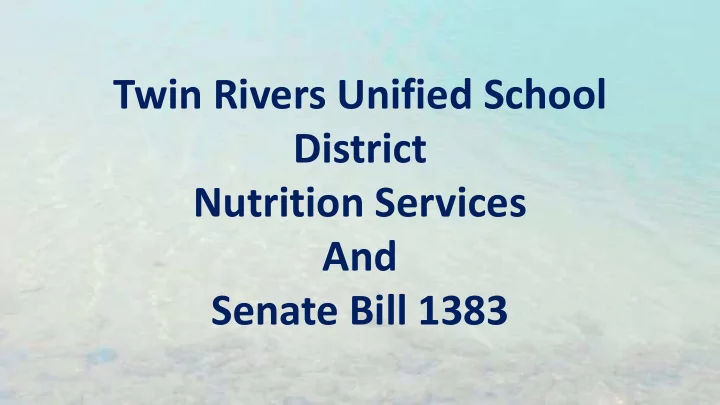

Twin Rivers Unified School District Nutrition Services And Senate Bill 1383
Background • 2006: AB 32 • California Global Warming Solutions Act of 2006 • 2011: AB 341 • Mandatory commercial recycling program • 2014: AB 1826 • Mandatory commercial organic waste recycling • 2016: SB 32 • Greenhouse gas emissions target 40% below 1990 levels
2016: SB 1383 • Largest, most comprehensive bill • Establishes methane emission reduction targets • Landfilling 3 rd largest producer of methane • 50% reduction in organic waste from 2014 to 2020 • 75% reduction in organic waste from 2014 to 2025 • 20% of disposed edible food recovered • 1 in 8 Californian’s are food insecure • 1 in 5 California children are food insecure
Significance • Significant source of local air quality pollutants • NOx • PM2.5 • Effects of climate change already seen in California • Longer droughts • Warmer temperatures • Increasing wildfires • Coastal erosion due to rising sea levels
TRUSD Status • Republic Services currently hauls 8,041 yd 3 waste/year • 50% reduction = 4,020 yd 3 waste/year • 52 weeks = 77 yd 3 waste/week • Pilot Food Waste Recycling Program with Breathe California • Sierra View • Foothill Oaks • Woodridge • Allison • Dry Creek
CalRecycle Requirements • Separate bins for organic waste, non-organic recyclables • 20% edible food recovery • Training for employees and students • Record keeping of food recovery service/organization • Name, address, and contact information • Types of food to be collected • Established frequency of collection • Quantity of food collected • Copy of contracts
CalRecycle Opportunities • Invested $15 million in education campaign and customizable materials • https://www2.calrecycle.ca.gov/Listservs/Subscribe/152 • Food waste reduction grant program • Alameda County awarded $500,000 K-12 Smart Cafeteria Initiative • Awaiting budget signing • https://www2.calrecycle.ca.gov/Listservs/Subscribe/135
CalRecycle Consequences • Regulations not yet established • Expected by end of 2019 • School districts enforced directly by CalRecyle • Notice of violation • 60-90 days to address issue • Placed on non-compliance inventory list • Random & targeted site inspection from CalRecycle and hauler
References Blondin SA, Djang C, Metayer N, Anzman-Frasca S, Economos CD. “It’s just so much waste.” A qualitative investigation of food waste in a universal free School Breakfast Program. Public Health Nutrition. 18(9):1565-1577. Bloom J. Waste not, want not. https://grist.org/article/schools-waste-5-million-a-day-in-uneaten-food-heres-how- oakland-is-reinventing-the-cafeteria/. Accessed on June 7, 2019. California Air Resources Board. California Greenhouse Gas Emission Inventory-2018 Edition. https://www.arb.ca.gov/cc/inventory/data/data.htm. Accessed June 9, 2019. CalRecycle. SB 1383 Education and Outreach Resources. https://www.calrecycle.ca.gov/organics/slcp/education. Accessed on June 11, 2019. Nargi L. Millions of dollars worth of food ends up in school trash every day. What can we do? https://ensia.com/features/school-food-waste-solutions/. Accessed on June 7, 2019.
Recommend
More recommend